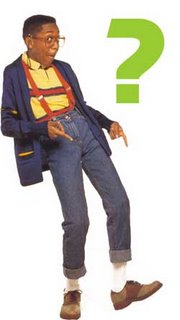In Praise of Urkel
 You may laugh, but I think that television’s beloved Urkel
You may laugh, but I think that television’s beloved Urkelhas performed this nation a great service. Think of it this
way: we live in a society in which a large percentage of us
are, for lack of a better term, homebound. I’m not speak-
ing of those who suffer this condition due to age or infirmity,
but of those who suffer it by choice. These are the ones
who–for a variety of reasons, ranging from emotional
unhappiness to innate suburban dullness–come right home
from work, flip on the teevee, and stare at it until it’s late
enough to go to bed. Because the lion’s share of these
people are white and live in white enclaves, they are per-
haps more likely than others to accept the popular media’s
presentation of other races, particularly blacks. Nowadays,
of course, these presentations aren’t always negative, but
they’re one-dimensional and restrictive nonetheless. On
television these days, African-Americans tend to smart-
mouthed sidekicks, rappers, sports heroes, gruff-but-
kindhearted police captains, and assorted varieties of street
people. Some of these are flattering, some far less so, but
we have to admit that, overall, it’s a pretty limited and silly
way to depict of a group that makes up something like thir-
teen percent of the nation’s population.
Into this milieu waddled Steve Urkel, a black man and a big
old nerd. Urkel was, in many ways, a breakthrough role for
African-Americans on television. He played the accordion, he
didn’t know how to dress, he didn’t speak in scripted ebonics
cliches. Now, I was fortunate enough to go to inner-city public
schools, so the existence of black nerds wasn’t so much of a
revelation to me, but I imagine it being quite a shock in the
honky parts of America. “Come here, Midge,” said Tyler in
his rambling home on Foxwoods Lane, “Take a look at this
charming young nerd of color!” And the two of them sat
down in front of their very large televison, holding hands,
and had their minds expanded as they watched Jaleel
White’s grand and broad comic performances.
Perhaps, thanks to Urkel, a lot of well-meaning but shel-
tered types were able to look at another race as a little
less distant and exotic. Maybe, since they were forced
to imagine a black nerd, they would have a little less
trouble imagining a black botanist, a black librarian, a
black computer programmer, a black mathematician, a
black chess grandmaster, a black astronomer or a black
neurosurgeon. Popular culture is at its best, I think, when
it reminds us that human variety is spectacular, surprising
and beautiful. Urkel had a part in this. For that, we owe
him some love.
Strangely enough, I’m not kidding.

